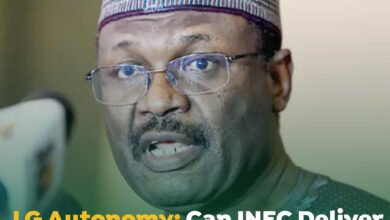
The Economic and Financial Crime Commission (EFCC) has come under heavy criticism following a series of incidents involving unprofessional conduct by some of its operatives.
The latest incident sparking public outrage involved a violent raid at a Lagos hotel on June 27th, 2024.
A viral video clip showed EFCC agents forcefully entering a room, ransacking it, and manhandling a female hotel staff member.
This incident adds to growing concerns about the agency’s tactics. Many Nigerians are demanding a complete overhaul of the EFCC to ensure it functions according to its core mandate.
A Pattern of Unprofessional Conduct
The Lagos hotel raid is not an isolated incident. In recent times, the EFCC has been criticized for heavy-handed tactics and a disregard for proper procedure. On November 1st, 2023, EFCC officers conducted a night raid at the Obafemi Awolowo University in Ile Ife, arresting over 70 students. The agency claimed they were targeting suspected internet fraudsters, but the late-night operation and mass arrests sparked criticism and accusations of racial profiling. The EFCC eventually released 58 students and banned further night raids.More controversy arose in June 9th, 2024, when the EFCC arrested 127 people in Akure on suspicion of internet fraud. This raid also led to protests, with accusations of wrongful arrests and a lack of due process. Youths demanded the release of those detained, highlighting concerns about the EFCC’s methods.
EFCC Response and The Need for Reform
Following the Lagos hotel incident, EFCC Chairman Ola Olukayode ordered the arrest of the two officers involved in the assault and promised a thorough investigation.
“The Executive Chairman of the Economic and Financial Crime Commission, EFCC, Mr. Ola Olukayode, has ordered the arrest of two officers of the commission allegedly involved in the manhandling of a female staff of the Regional Hotel, Ojo, Lagos,” Dele Oyewole, the EFCC spokesperson said in a statement
He assured the public that the EFCC would continue to operate professionally and with respect for the rule of law. However, many Nigerians remain skeptical.
Analysts point out that the agency must take concrete steps to address the root causes of these issues.
Calls are growing for the EFCC to purge itself of corrupt or unscrupulous elements within its ranks. Some analysts reference the disbanded Special Anti-Robbery Squad (SARS) as a cautionary tale. They argue that ignoring public concerns about police brutality ultimately led to the #EndSARS protests.
“Before Nigerians demand enough is enough from EFCC, the agency must learn from the sad ending of the SARS,” Ismail Alabi contended.
Rebuilding Trust and Following Due Process
The EFCC’s website outlines its core values as integrity, professionalism, courage, and collaboration. Its mission is to eradicate economic and financial crimes through prevention, enforcement, and collaboration.
However, recent operations have strayed from these principles. Critics point to issues like wrongful profiling, confiscation of property without due process, and unlawful arrests.
Lawyers and human rights activists like Deji Adewale argue that the EFCC must be brought back to its original mandate to prevent further damage to public trust and economic activity.
They emphasize the need for accountability and transparency within the EFCC and all government institutions.
Moving Forward
The EFCC needs to take decisive action to regain public trust.
Analysts have advised that a thorough investigation into the Lagos hotel raid, along with appropriate disciplinary measures for those involved, is a crucial first step.
They also want the agency to also re-evaluate its tactics to ensure they comply with due process and avoid racial profiling.
Furthermore, the EFCC has been enjoined to improve communication with the public. Clearly explaining the reasons behind raids and arrests, while being transparent about the outcomes, will go a long way in rebuilding trust.
Many believe by upholding its core values and adhering to the rule of law, the EFCC can once again fulfill its mission of effectively combating economic and financial crimes in Nigeria.




